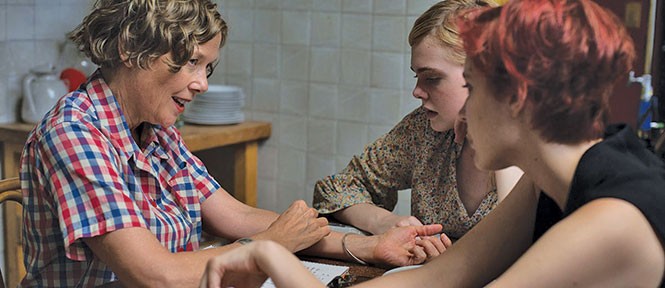
If you were given just a thumbnail description of the plot of writer/director Mike Mills' 20th Century Women, you might think you'd know what to expect from the character of Dorothea Fields (Annette Bening). The 55-year-old single mother of a 15-year-old son, Jamie (Lucas Jade Zumann), in 1979 Santa Barbara, Dorothea struggles with the confidence that she can provide everything Jamie needs to grow up emotionally healthy. So she turns to two younger women for additional support: 24-year-old photographer Abbie (Greta Gerwig), one of the boarders in their house; and 17-year-old Julie (Elle Fanning), their sexually precocious neighbor. And cue the baffled resistance of child-of-the-Depression Dorothea to anything these crazy kids might have to teach her son. Right?
Not quite. Dorothea, it turns out, is something of a trailblazer herself, a woman who went to flight school for a chance to fight in World War II, and a trained architect. When Abbie plays a punk record for Jamie, she's curious enough to try to understand the appeal rather than dismissing it; when Jamie gets in trouble at school for cutting class, she supports his desire for occasional extracurricular exploration. Bening's performances are almost invariably lovely in their subtlety, but here she's playing a particularly fascinating sort of character. Dorothea is a progressive who wants to keep up with the pace of the modern world, but isn't quite sure that she can.
That dynamic—and Mills' warm, compassionate take on it—energizes much of 20th Century Women, even as he navigates through several other relationships in this strange makeshift family. Jamie harbors an unrequited crush on Julie, who sneaks in through his bedroom window so that he can be her platonic confidante. Abbie begins a fling with Dorothea's other boarder, hippie mechanic William (Billy Crudup), even as she awaits news on whether she's healthy after a bout with cervical cancer.
Mills navigates through all these characters deftly, stopping occasionally to provide backstory about the circumstances that shaped them (and, perhaps more surprisingly, to have them narrate what becomes of them after the events portrayed here). His affection for these characters is evident, but he's not always effective at shaping 20th Century Women's many episodes into a cohesive narrative. At times he seems distracted by punching hard on the historical specificity of his setting—the pop-music needle-drops, captions on screen explaining the seminal texts the characters are reading, or the pessimistic "crisis of confidence" speech by President Jimmy Carter that seemed to doom his chance for a second term—such that it seems nothing could have been quite so difficult as growing up in this particular place at this particular time. Indeed, there are moments when Mills all but puts a caption on the screen to tell us that This Is a Coming-of-Age Story, and Things Were Never the Same After That Important Year.
The center is strong, however, and it's strongest when the women are working through the generation gaps that divide them. Best of all is a wonderful scene set at one of Dorothea's dinner parties, where she and her guests shift uncomfortably over Abbie's insistence on normalizing the word "menstruation," and Julie gets a bit too-much-information-y about the loss of her virginity. There's not much in the way of laugh-out-loud comedy, but Mills finds gentle humor as well as drama in the way that their individual sense of age-appropriate instruction creates bumps in this plan to serve as Jamie's assistant life mentors.
At its heart, though, this is Dorothea's story more than it is any of the other characters', and Bening brings a grace to the role that's beautiful to watch. She gets miles out of the eye shift that indicates her shock at realizing the family car—and by obvious extension, herself—has gotten old. It's even more heartbreaking observing her attempts to better understand her son, while resisting opening her own fears and anxieties up to him in return. Portraits of a parent don't get much more multilayered than this one, in its respect for a woman willing to push herself into uncomfortable places, and keep learning about the world, all to do the best possible job at making her son a person who won't need her anymore.